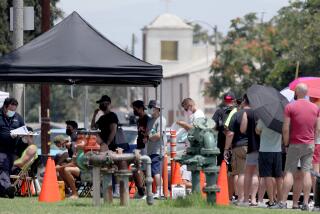A Slow Beginning on Smallpox
The nation’s effort to inoculate emergency health-care workers against smallpox sputtered to a start Friday as only four physicians agreed to be vaccinated in Connecticut -- the latest sign of growing resistance to the Bush administration’s aggressive plan.
An increasing number of unions urged members not to roll up their sleeves for the voluntary inoculations, saying that the federal government has not yet created a compensation fund for people who suffer side effects and miss work because of the vaccine. They want free screenings for conditions that put people at high risk of complications, and protection against discrimination if they decline to participate, among other things.
Health experts are worried that the unions’ public outcry could slow or even cripple the president’s plan to vaccinate as many as 500,000 emergency health-care workers within weeks. This is the first phase of the administration’s effort to protect the country against a bioterrorist attack using the smallpox virus.
The resistance may not stop the plan completely, “but it certainly is going to make it roll out a lot more slowly than we had anticipated,” said Dr. Georges Benjamin, executive director of the American Public Health Assn. He predicted that the anti-vaccination movement will grow.
The concern is mounting as vaccinations are set to begin next week in Los Angeles County, the first inoculation site in California.
County public health nurse Rosie Martinez, 58, said she had already said no. She is worried that she could unintentionally infect her clients -- high-risk pregnant women and children. “Even though they’ve given us reassurance that it won’t happen, I’m still concerned,” she said.
Federal health officials said they are trying to address the health workers’ concerns.
“They can be worked out,” said K.D. Hoskins, spokeswoman for the U.S. Centers for Disease Control and Prevention. “Once it’s clear what the federal government is going to do, unions will get behind this. They want to see this happen. They realize it’s important.”
The unions raising concerns or calling for their members not to participate include the Service Employees International Union, the California Nurses Assn., the American Federation of State County and Municipal Employees, and nursing unions in Massachusetts and Rhode Island. The California Nurses Assn., the state’s largest nurses union, announced Thursday that it opposes the vaccinations, in part on political grounds, objecting to the mobilization for war with Iraq.
Meanwhile, at least five hospitals in Los Angeles County have told health officials that they will not participate when the inoculations begin next week. Some say that they need more time to consider the matter or don’t see smallpox as an immediate threat.
The hospitals are Huntington Memorial Hospital in Pasadena, Beverly Hospital in Montebello, St. Mary Medical Center in Long Beach, Suburban Medical Center in Paramount and Bellflower Medical Center in Bellflower, according to the county Emergency Medical Services Agency.
“We chose not to proceed based on the threat analysis,” Huntington spokeswoman Connie Matthews said. “We do have a plan to vaccinate a team of first responders, should the threat become more imminent.”
At the nation’s first vaccination site, dozens of reporters watched Friday as three doctors, including the state’s chief epidemiologist, rolled up their sleeves for inoculations at the University of Connecticut Health Center in Farmington. A fourth doctor had been vaccinated earlier in the day.
The Connecticut plan called for most of the 20 members of the state’s Genesis Team to receive the vaccine. The team, consisting of volunteers, will travel to hospitals throughout the state to administer smallpox vaccine to other health professionals.
Dr. Michael Grey, associate professor of clinical medicine at the health center, said the number of volunteers dwindled from 15 at the week’s start to eight or nine on Thursday, and to the four on Friday. Grey attributed the reluctance to the opposition of various health-care unions.
Hoskins said the Centers for Disease Control and Prevention was not concerned by the slow beginning to the vaccine program. “Today is only the beginning of the implementation.”
Unions aren’t the only ones concerned about the Bush administration’s program. The Institute of Medicine last week called the vaccination effort “a program with inherent serious risks and with publicly unknown and unstated benefits.”
Among these risks is death. About one to two people per million die of complications caused by the vaccine, which is harvested from calves’ bellies. As many as 52 people per million experience life-threatening complications, including encephalitis, while 1,000 more suffer reactions such as serious rashes.
“Failure may be a good thing,” said Linda Rosenstock, dean of the UCLA School of Public Health. “Then we’re going to expose less people now to an intervention strategy that doesn’t meet scientific muster.”
Others said it is too soon to say whether Bush’s plan is workable. Dr. Richard Raymond, chief medical officer for Nebraska’s Health and Human Services System, said he thinks Connecticut’s first day of vaccines may have had a low turnout because there wasn’t enough time for preparation.
“Everybody wants to be first. Maybe they didn’t have enough time to pull it off,” he said. Raymond said Nebraska hospitals support the vaccine program, despite the union opposition.
In Los Angeles County, where officials are preparing for next week’s inoculations, the health department asked for 900 doses of vaccine for public health workers and other governmental agencies that would need to respond rapidly to suspected smallpox cases. An additional 8,300 doses were requested for hospital emergency personnel.
Public health officer Dr. Jonathan Fielding said the county wants 30 immunized public health workers who can vaccinate others and 12 more to respond to suspected cases.
Opal Craft, a nurse at Long Beach Memorial Medical Center, said she won’t be vaccinated, and doesn’t know a single colleague who is willing.
“I just don’t think it’s been investigated enough,” she said.
At Cedars-Sinai Medical Center, Dr. Joel Geiderman, co-chairman of the Department of Emergency Services, said only six of the 26 doctors he recently polled said they would volunteer. Geiderman is joining them.
“I sort of feel a sense of duty to get it done -- duty to my patients, to the public, even to my country. I’m patriotic,” he said. “I want to be able to help my patients if they need me.”
*
Ornstein and Lelyveld reported from Los Angeles. Goldman reported from New York.
More to Read
Sign up for Essential California
The most important California stories and recommendations in your inbox every morning.
You may occasionally receive promotional content from the Los Angeles Times.











